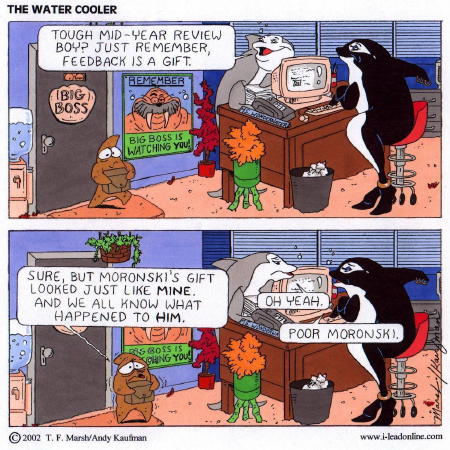Horizon Time
A leadership development resource
from the Institute for Leadership Excellence & Development Inc. (I LEAD)
Volume II
Number 2
On the Horizon This Issue:
Feedback is a Gift
A gift? Then why doesn't it feel that way?
Relief from E-Mail Overload
Trouble keeping up with e-mail?
Join the growing list of people benefiting from this resource.


Learn how to handle change more
effectively. Lead change at work that sticks.. Click on the cover above for
details.

Feedback is a Gift
By Andy Kaufman
I used to hate it when she said it...
“Remember, feedback is a gift!”
One of the best bosses I hated to work for used to regularly pull that line. The truth is I didn’t hate to work for this leader. It’s just that working for her wasn’t easy because, among other things, she was exceptional at delivering the gift… often when her direct reports least wanted to hear it.
It took me more years than I want to admit to embrace the wisdom about feedback. As someone who intersects with countless people in organizations all over the world, I’m finding this isn’t just an Andy issue. It is the rare person, even among senior executive ranks, who truly embraces constructive feedback.
Feedback Driving Performance
A pilot without the feedback of his instruments is headed for disaster. So is the prospective leader doomed if she does not develop the ability to respond productively to constructive feedback.
Learning to accept feedback as a gift takes time, so here are the steps you need to take to get started.
1. Seek it out
Great feedback is often hard to find. As someone who makes a living speaking, I'm regularly seeking ways to improve my craft.
Yet, here’s what I’ve found. Once a person develops good platform skills, it’s almost impossible to get constructive feedback. Instead, you hear things like, “I could never speak like that.”That’s a problem. Allowing our strengths to get flabby stunts our professional growth.
And what about the areas where we’re not as strong? If you are not actively seeking feedback on these areas (and responding to it when you get it), your path to greater responsibility and success will be riddled with obstacles.
 One way
I’ve tried to implement this teaching is to join an organization called the
Windy City Professional Speakers. Windy City is filled with people who
speak for a living and excel at giving finely tuned constructive
feedback.
One way
I’ve tried to implement this teaching is to join an organization called the
Windy City Professional Speakers. Windy City is filled with people who
speak for a living and excel at giving finely tuned constructive
feedback.
The result? We help develop significantly better speakers, trainers, and facilitators.
Do I enjoy peers pointing out areas where I need to improve? Not particularly. But I’ve learned I have limited opportunities to get significantly better at my trade without it.
What is your Windy City equivalent? Do you have someone in your life that will tell you when you have bad breath, so to speak? You need them.
It could be you’ve surrounded yourself with people who pretty much see the world like you do. It might be that people would provide you helpful feedback but they're concerned you'll fly off the proverbial handle--or worse, not listen to it. Or it could be people would be willing to give you constructive feedback, but they just need a sincere invitation.
Seek it out.
When feedback is not given outright, look for patterns of what is said (and not said). For example, what recurring themes show up in your performance reviews? What does the collective body language of your team really look like when you’re facilitating staff meetings? What is your boss not saying that you feel you should be hearing?
You’re getting feedback indirectly. Listen closely. Seek out people who can give you the feedback you need. Then invite them to give it.
2. Find the gift
I recall a Windy City meeting when a relatively new member gave their speech. It was a decent presentation, but there was plenty of work required to really polish it. When it came time for the feedback, it was direct.
 She didn’t take it well. She was defensive. She was almost in tears at
one point. Clearly, this did not feel like a gift.
She didn’t take it well. She was defensive. She was almost in tears at
one point. Clearly, this did not feel like a gift.
In the case of Windy City, we’re respectful with feedback, but we don’t sugar coat it. Positive feedback is readily given, and constructive feedback is truly given in the spirit of a gift, regardless of whether or not the recipient is ready to open it.
Part of the challenge is that our first reaction to feedback is often negative. According to Stan Piskorski, a successful sales trainer with Corporate Dynamics, Inc., "80% of feedback is perceived as negative."
Piskorski shares an example: "Let's say your boss walks up to you and says in a neutral tone, 'Please come to my office. I have something to talk with you about.' What's your first reaction? Probably negative."
Constructive feedback is often hard to take. Perhaps even after trying to objectively analyze the feedback, it just doesn't seem to be valid. What to do when there doesn't appear to be a gift?
Keep looking. Remember the story former President Ronald Reagan often told about the young boy who was given the job of shoveling out the stalls in the barn. The boy tackled the chore with great enthusiasm, heartily digging into the manure, because he was convinced that "there's got to be a pony in here somewhere." Even when it seems like you’re “getting dumped on”, there could just be a pony in there somewhere.
That said, remember to consider the source. People can have agendas. Also, they can be flat out wrong in their assessment. It very well could be that the gift is a reminder that you need to heavily discount that person’s opinions!
But even when the feedback doesn't feel good, err on the side of finding the nugget of truth you need to hear.
3. Help others by giving constructive feedback
Learning to take constructive feedback as a gift is a big challenge. Yet if you want to grow in your ability to develop people, you need to get more comfortable with providing constructive feedback to others.
Piskorski believes people have a negative bias regarding feedback because most managers only provide feedback when correction is necessary. I have seen the opposite as well. Too many managers fall into the trap of thinking that it's more effective to not correct at all. For some, it's about being popular. For others, they're fearful they might negatively impact performance by getting the person upset.
The effective manager needs to provide specific, timely feedback for the things being done well and the things that need correction.
One day it finally became clear to me that I was actually hurting the people around me if I withheld feedback that would help them. You can actually help others by giving them respectful, timely, direct feedback. How, when, and under what circumstances are issues to be considered.
 Yet even if it is difficult for them to hear at first,
they may just thank you for it some day.
Yet even if it is difficult for them to hear at first,
they may just thank you for it some day.
Taking the Next Step
Want to improve your ability to see feedback as a gift? Seek it out. Find the gift. Help others by giving feedback--both about the things they are mastering and the areas they need to improve.
“Feedback is a gift.” Oh how I hated to hear that back then. But to my last point, today I can only say "thank you" for teaching me that lesson, Cindy. It truly was a gift.
Andy Kaufman
Speaker, Author, Consultant
President, Institute for Leadership Excellence & Development Inc.
Personal Reflection Questions
1. Who are the people in your life that will consistently tell you what
you need to hear, regardless of whether or not you want to hear it?
2. What are some consistent themes you hear in performance reviews?
What have you consistently wanted to hear but haven't?
3. Who on your staff or in your area of influence really needs to hear
feedback from you that, for some reason, you've held back on giving?
In what ways are you not helping the person by not providing the feedback?
Relief for E-Mail Overload
 Trouble
keeping up with e-mail? You're not alone.
Trouble
keeping up with e-mail? You're not alone.
Join the rapidly growing number of people around the world who are getting a better grip on their e-mail while reducing stress.
Click on the e-book cover on the left to learn about How to Organize Your Inbox & Get Rid of E-Mail Clutter.
Practical. Easy-to-read e-book. Effective.
Click here for more information.
Stay in Touch!
Horizon Time is written by Andy Kaufman and is available via e-mail or on the Web for all who register. You are invited to forward this to anyone interested in growing their leadership skills!
If you have any difficulty with the hyperlinks in this newsletter, you can view it online at:
www.i-leadonline.com/newsletter/0307.htm.
You can access past issues of Horizon Time by visiting www.i-leadonline.com/NewsletterIndex.asp.
If this was forwarded to you by a colleague and you would like to automatically receive issue, click here. Want to stop receiving these? Click here.
For more information on Andy Kaufman and the Institute for Leadership Excellence & Development Inc., please visit our web site.
You can contact Andy by phone toll-free at (866) 88 I-LEAD (866-884-5323), or by e-mail at andy@i-leadonline.com.
Editors and Newsletter Writers! Would you like to use some of the
material from this newsletter in your newspaper, magazine, newsletter?
You may by including the following credit line:
"This article is used by permission from Andy Kaufman's newsletter 'Horizon Time' available at www.i-leadonline.com."
Please call or send an e-mail to let
us know you used the article.
This information cannot be used for resale in any manner.
Horizon Time contains hyperlinks to web sites operated by persons other than the Institute for Leadership Excellence & Development Inc. (I LEAD). Such hyperlinks are provided for your reference and convenience only, and I LEAD is not responsible for the content or operation of such web sites. A hyperlink from Horizon Time to another web site does not imply or mean that I LEAD endorses the content on that web site or the operator or operations of that site. You are solely responsible for determining the extent to which you may use any content at any other web sites to which you might link from Horizon Time.
Copyright © 2001-2004, Institute for Leadership Excellence & Development Inc. (I
LEAD)
![]()

